-
REVIEW01-01-2018
Health promotion programs in higher education: integrative review of the literature
Revista Brasileira de Enfermagem. 2018;71:1714-1723
Abstract
REVIEWHealth promotion programs in higher education: integrative review of the literature
Revista Brasileira de Enfermagem. 2018;71:1714-1723
DOI 10.1590/0034-7167-2016-0693
Views0See moreABSTRACT
Objective:
to characterize the interventions of health promotion programs implemented in Health Promoting Universities; to analyze the results of the interventions of health promotion programs.
Method:
integrative review carried out in EBSCO, PubMed, SciELO, Scopus and Web of Science. Articles published between 2000 and 2014 were selected, with evidence of health promotion intervention programs and evaluation of results. Results: 17 articles were included. The health promotion programs aimed at increasing the welfare of students, with an emphasis on physical activity, sexual health and on improving the environment of health support within the university community.
Conclusion:
health promotion strategies in an university context do not always result from the convergence between educational, political, legislative or organizational actions that support lifestyles and conditions which are favorable to the health of individuals or groups, and that contribute to improving the physical and social environment.

-
RESEARCH01-01-2018
Contraceptive behavior of Portuguese higher education students
Revista Brasileira de Enfermagem. 2018;71:1706-1713
Abstract
RESEARCHContraceptive behavior of Portuguese higher education students
Revista Brasileira de Enfermagem. 2018;71:1706-1713
DOI 10.1590/0034-7167-2017-0623
Views0See moreABSTRACT
Objective:
To characterize the contraceptive practices of higher education students and to identify factors that contribute to the use of different contraceptive methods.
Method:
A cross-sectional, descriptive correlational study was carried out with a sample of 1946 students, with a mean age of 21 years (20.74±2.32), who attended courses at a University in the North of Portugal.
Results:
Of the factors studied, the female gender, younger ages, previous behavior of condom use, knowledge about contraception, attitude and self-efficacy for condom use were associated with safer contraceptive choices.
Conclusion:
Investing in sexual education for young people is an important public health strategy that can empower youth to make more appropriate choices and improve adherence to contraceptive methods, reducing the risk of unintended pregnancies and sexually transmitted diseases.
-
RESEARCH01-01-2018
Nursing and Global Health: social determinants of health in the training of nurses
Revista Brasileira de Enfermagem. 2018;71:1700-1705
Abstract
RESEARCHNursing and Global Health: social determinants of health in the training of nurses
Revista Brasileira de Enfermagem. 2018;71:1700-1705
DOI 10.1590/0034-7167-2017-0631
Views0See moreABSTRACT
Objective:
To evaluate to which extent nursing professors understand how social determinants of health impact on health, and whether the topic is addressed in nursing undergraduate education in Brazil.
Method:
This is a methodological study carried out with 222 nursing faculty members from Brazilian higher education institutions. The answers of the domain “Social and environmental determinants of health”, concerning a questionnaire on “Core Competencies in Global Health”, were analyzed.
Results:
Most professors have over 10 years of experience in nursing higher education. A large part of the participants strongly agreed or agreed on the importance of college subjects related to the above-mentioned topic for the education of the nurses.
Conclusion:
The professors in this study agreed that social and environmental health determinants must be taught in Nursing school, since it is necessary that nurses value this knowledge, slowly making it a part of the curriculum framework.
-
RESEARCH01-01-2018
National Licensure Exam for Brazilian Nurses: why and for whom?
Revista Brasileira de Enfermagem. 2018;71:1692-1699
Abstract
RESEARCHNational Licensure Exam for Brazilian Nurses: why and for whom?
Revista Brasileira de Enfermagem. 2018;71:1692-1699
DOI 10.1590/0034-7167-2017-0929
Views0See moreABSTRACT
Objective:
To analyze critically the reasons for regulating a National Licensure Exam for Brazilian Nurses (NLEXB-N).
Method:
Qualitative study with secondary source applying the critical discourse analysis to situate context and intertextuality in the establishment of a new social practice. We analyzed data from legal documents regulating the National Licensure Exam of other professions in Brazil, the Educational Census, the Survey of Brazilian Nursing Profile and global nursing literature.
Results:
Four themes were explored: Brazilian experiences with this exam; nursing experiences in other countries; effects of the exam on the examinees; NLEXB-N in Brazil: what purposes could we present?
Final considerations:
The National Licensure Exam for Brazilian Nurses is a measure of individual accountability that increases social injustice, inequality and inequity. We must pay attention to the consequences of its application, based on evidences produced in the area.

-
RESEARCH01-01-2018
North American nurse educators in the HOPE Earth Project and Nursing teaching
Revista Brasileira de Enfermagem. 2018;71:1685-1691
Abstract
RESEARCHNorth American nurse educators in the HOPE Earth Project and Nursing teaching
Revista Brasileira de Enfermagem. 2018;71:1685-1691
DOI 10.1590/0034-7167-2017-0825
Views0See moreABSTRACT
Objective:
analyze the activities of the North American nurse educators of the Project Health Opportunity for People Everywhere Earth (HOPE Earth Project) in Natal, state capital of Rio Grande do Norte, Brazil (1974-1981).
Method:
sociohistorical, qualitative study, resulting from filed documents and ten semistructured interviews. These sources were processed and analyzed using Oral History and Thematic Analysis.
Results:
the following categories emerged: The North American nurse educators of the HOPE Earth Project and Educator Mary Anne Small through the memories of who had contact with her.
Final considerations:
the HOPE Earth Project contributed to higher education in health at the Federal University of Rio Grande do Norte, guaranteeing the coming of qualified and experienced lecturers, and the North American educators cooperated towards the qualification of the Nursing Course, even when it was already structured and fully functioning.

-
RESEARCH01-01-2018
Teachers’ experiences about first aid at school
Revista Brasileira de Enfermagem. 2018;71:1678-1684
Abstract
RESEARCHTeachers’ experiences about first aid at school
Revista Brasileira de Enfermagem. 2018;71:1678-1684
DOI 10.1590/0034-7167-2017-0715
Views0See moreABSTRACT
Objective:
To unveil the experiences of primary and elementary school teachers about first aid at school.
Method:
a descriptive, qualitative study, conducted in May 2014, from a focus group with nine teachers from the municipal network of Bom Jesus-PI. Audio recording occurred, content was transcribed, and data were processed by IRAMUTEQ software and analyzed from the Descendant Hierarchical Classification.
Results:
Three classes were obtained: Teachers’ knowledge about first aid (influence of maternal experience, belief in popular myths and awareness of lack of preparation were indicated); Feelings in situations of urgency and emergency (anguish, fear and concern); First aid at school, (occurring in class or during break time, coming from collisions and syncope).
Final considerations:
The research evidenced experiences based on popular beliefs, family experiences and knowledge gaps. The lack of preparation was evidenced by the teachers’ reports about having misconduct during first aid at school.

-
RESEARCH01-01-2018
Problematization methodology in primary healthcare teaching
Revista Brasileira de Enfermagem. 2018;71:1671-1677
Abstract
RESEARCHProblematization methodology in primary healthcare teaching
Revista Brasileira de Enfermagem. 2018;71:1671-1677
DOI 10.1590/0034-7167-2017-0157
Views0See moreABSTRACT
Objective:
To identify the contribution of the problematization methodology in primary healthcare teaching in a nursing undergraduate course.
Method:
Documentary, descriptive and qualitative study, carried out with undergraduate students from the Ribeirão Preto College of Nursing at the University of São Paulo. Data were collected through analysis documents which consisted of 21 evaluation forms filled out by first-year undergraduate students in the 2013 school year taking the subject Comprehensive Health Care I, whose theoretical framework was focused on primary health care.
Results:
It was found that the subject met the intended goals, allowed coordination between theory and practice, and enabled the contact of undergraduate students with the profession and work environment in the beginning of the course.
Final considerations:
Analysis of the evaluation forms for the subject Comprehensive Health Care I evidenced that the use of the problematization methodology favored primary healthcare teaching.
-
RESEARCH01-01-2018
Nursing students facing moral distress: strategies of resistance
Revista Brasileira de Enfermagem. 2018;71:1663-1670
Abstract
RESEARCHNursing students facing moral distress: strategies of resistance
Revista Brasileira de Enfermagem. 2018;71:1663-1670
DOI 10.1590/0034-7167-2017-0072
Views0See moreABSTRACT
Objective:
To understand the resistance strategies adopted by undergraduate students in nursing, faced with situations of moral distress (MD).
Method:
Qualitative research, developed in three universities in the south of Brazil, two federal and one private, with 21 undergraduate students in nursing from December 2015 to February 2016; the data was submitted to the discursive textual analysis and Foucauldian theoretical reference.
Results:
Students resisting demonstrate a sense of self-preservation and moral empowerment. Moreover, non-resistance initiatives are related to the fear of possible sanctions. Thus, by resisting or not, students may experience both positive and negative repercussions.
Final considerations:
By resisting, students aim to defend what they believe to be right, demonstrating their moral empowerment in the face of their moral distress. However, the exercise of disciplinary power seems to contribute to their moral fragilization, making it difficult to implement resistance strategies.

-
ORIGINAL ARTICLE01-30-2023
Adverse dermatoneurological events and impacts on daily activities of patients with gastrointestinal neoplasms undergoing chemotherapy
Revista Brasileira de Enfermagem. 2023;76(1):e20220161
Abstract
ORIGINAL ARTICLEAdverse dermatoneurological events and impacts on daily activities of patients with gastrointestinal neoplasms undergoing chemotherapy
Revista Brasileira de Enfermagem. 2023;76(1):e20220161
DOI 10.1590/0034-7167-2022-0161
Views0See moreABSTRACT
Objective:
to associate the presence and grading of adverse dermatoneurological events (peripheral neuropathy and hand-foot syndrome) and the interference in the activities of daily living of patients with gastrointestinal neoplasms undergoing systemic antineoplastic treatment.
Method:
this is a longitudinal, prospective study, using instruments to assess hand-foot syndrome and peripheral neuropathy.
Results:
there were 36 patients: 66.7% diagnosed with colon cancer and 83.2% on combination therapy. From cycle 5 onwards, all of them had hand-foot syndrome, with a majority of grade 1, unrelated to interference in activities of daily living. Regarding peripheral neuropathy, there was a moderate to strong correlation from cycle 1 of treatment.
Conclusion:
peripheral neuropathy negatively affects activities of daily living. The monitoring of dermatoneurological events by oncology nurses contributes to the clinical practice of nursing and subsidizes the development of advanced practice in the country.
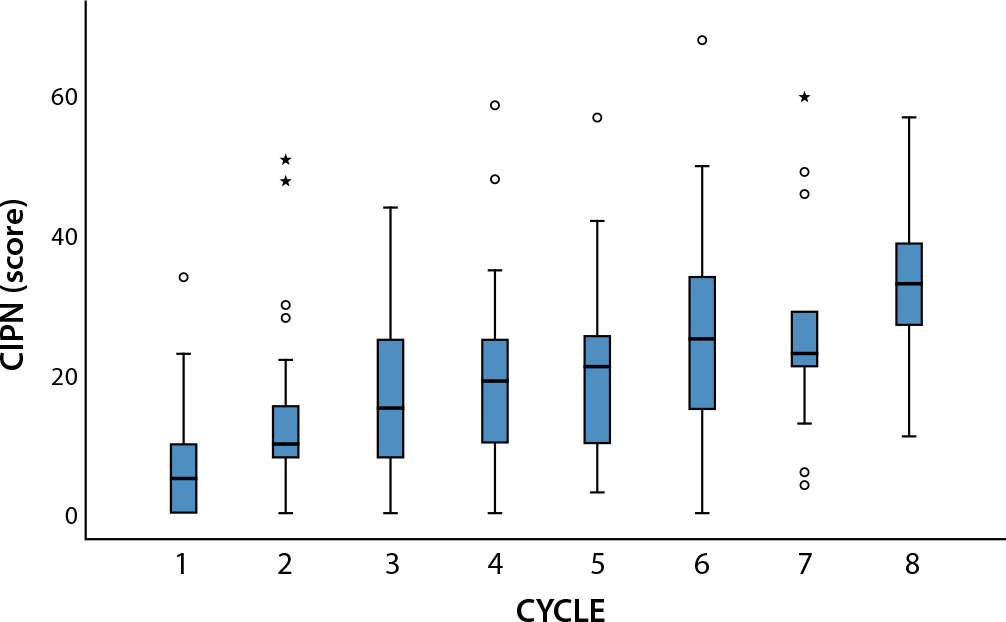
-
ORIGINAL ARTICLE12-16-2023
Elderly Mortality due to Ambulatory Care Sensitive Conditions and Primary Health Care Coverage in the Federal District
Revista Brasileira de Enfermagem. 2023;76(1):e20220170
Abstract
ORIGINAL ARTICLEElderly Mortality due to Ambulatory Care Sensitive Conditions and Primary Health Care Coverage in the Federal District
Revista Brasileira de Enfermagem. 2023;76(1):e20220170
DOI 10.1590/0034-7167-2022-0170
Views0See moreABSTRACT
Objectives:
To describe the mortality coefficients of elderly due to primary care sensitive conditions, from 2008 to 2018, and determine its association with the coverage of the Primary Health Care (Family Health Strategy and Basic Care models) in the Federal District.
Methods:
Ecological time series of mortality in Federal District elderly, from 2008 to 2018. The Poisson regression model was applied, considering as significant those with p<0.05, with a CI of 95%.
Results:
There were 70,503 deaths. There was a decrease in the risk of death of elders due to cardiovascular diseases and diabetes. Higher primary care coverage decreased the chance of death by sensitive conditions, both in Basic Care (OR: 0.994, CI: 0.990-0.998) and in the Family Health Strategy (OR: 0.997, CI: 0.995-0.999).
Conclusions:
Primary Care coverage was associated with a lower chance of death of the elderly due to Ambulatory Care Sensitive Conditions, especially in Basic Care.
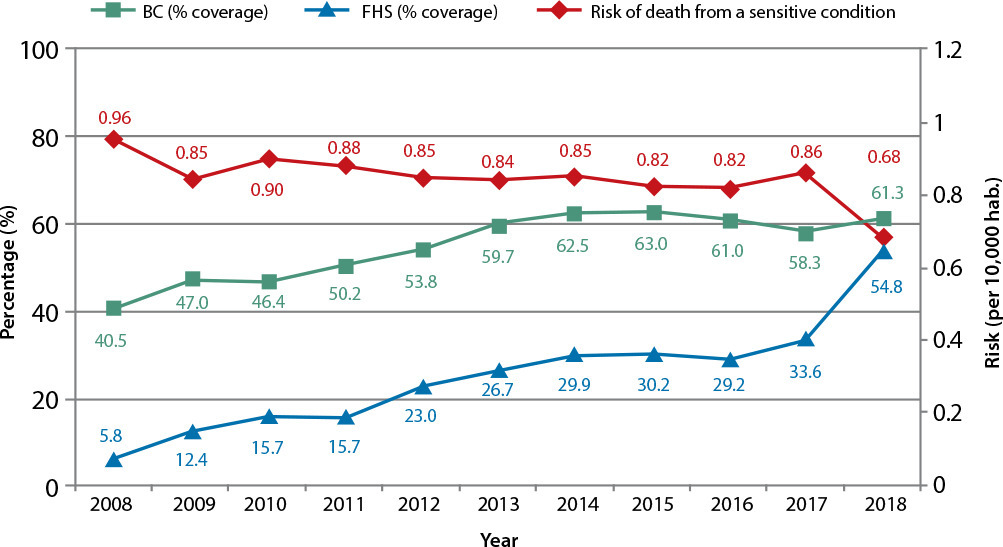
-
ORIGINAL ARTICLE11-28-2023
Syphilis in pregnancy and congenital syphilis: women’s experiences from the perspective of symbolic interactionism
Revista Brasileira de Enfermagem. 2023;76(1):e20220210
Abstract
ORIGINAL ARTICLESyphilis in pregnancy and congenital syphilis: women’s experiences from the perspective of symbolic interactionism
Revista Brasileira de Enfermagem. 2023;76(1):e20220210
DOI 10.1590/0034-7167-2022-0210
Views1See moreABSTRACT
Objectives:
to understand the meanings attributed by women to the diagnosis and treatment of syphilis and congenital syphilis, and to outpatient follow-up of their children.
Methods:
this is a qualitative study conducted with 30 mothers of children with congenital syphilis using audio-recorded semi-structured interviews, which were submitted to inductive thematic analysis. Symbolic interactionism was the theoretical framework considered in this study.
Results:
two themes were identified, showing the maternal diagnosis involved shock, guilt, and fear of social exclusion, in addition to frustration due to failure to prevent vertical transmission. Moreover, the painful clinical procedures for the child’s treatment enhanced maternal guilt, and the symbolic process of re-signification of the disease/treatment took place with the child’s healing.
Final Considerations:
understanding the intersubjective aspects involved in this experience helps nurses rethink their care practice and contributes to their critical role in the context of syphilis.
-
ORIGINAL ARTICLE11-28-2023
Brazilian undergraduate nursing students’ critical thinking need to be increased: a cross-sectional study
Revista Brasileira de Enfermagem. 2023;76(1):e20220315
Abstract
ORIGINAL ARTICLEBrazilian undergraduate nursing students’ critical thinking need to be increased: a cross-sectional study
Revista Brasileira de Enfermagem. 2023;76(1):e20220315
DOI 10.1590/0034-7167-2022-0315
Views0See moreABSTRACT
Objectives:
to map Brazilian undergraduate nursing students’ critical thinking level and investigate the correlation between selected sociodemographic data and critical thinking domains.
Methods:
in this descriptive cross-sectional study, participants’ (N=89) critical thinking was assessed using the Health Science Reasoning Test. Correlation between critical thinking domains and sociodemographic data was assessed using the Pearson correlation coefficient.
Results:
the overall results showed a moderate level of participants’ critical thinking (mean = 70.7; standard deviation 5.7). A poor performance was identified in 5 of the 8 critical thinking domains. A significant positive correlation was found between education period and critical thinking (p<.001).
Conclusions:
poor level in students critical thinking domains may lead to negative consequences for their learning outcomes. Further studies should be carried out to confirm our results, in addition to investigation of teaching methods that encourage and ensure the development of students’ critical thinking skills during nursing education.
-
ORIGINAL ARTICLE02-06-2023
Teaching entrepreneurship in undergraduate Nursing course: evaluation of an educational proposal
Revista Brasileira de Enfermagem. 2023;76(2):e20210244
Abstract
ORIGINAL ARTICLETeaching entrepreneurship in undergraduate Nursing course: evaluation of an educational proposal
Revista Brasileira de Enfermagem. 2023;76(2):e20210244
DOI 10.1590/0034-7167-2021-0244
Views1See moreABSTRACT
Objective:
To evaluate a proposal for teaching entrepreneurship in an undergraduate Nursing course that uses active methodologies and activities based on the theory of meaningful learning.
Methods:
Interventional, prospective study, with a quantitative perspective, with a total of 102 participating students, carried out from July 2017 to December 2019 at a public university in the state of Sao Paulo. Statistical analysis were performed by non-parametric Chi-square or Fisher’s exact tests, with differences considered statistically significant if p < 0.05.
Results:
Improvements were observed in almost all items evaluated, revealing that meaningful learning became more effective with the use of active teaching methodologies. Most students need adaptation and effort to be put into these methods.
Conclusions:
The proposal offers pedagogical content adaptation, specifically for nursing students. New research should expand teaching-learning techniques for the development of future nurses, preparing them adequately for the job market.

-
ORIGINAL ARTICLE03-06-2023
Medication reconciliation in pediatrics: a validation of instruments to prevent medication errors
Revista Brasileira de Enfermagem. 2023;76(2):e20210755
Abstract
ORIGINAL ARTICLEMedication reconciliation in pediatrics: a validation of instruments to prevent medication errors
Revista Brasileira de Enfermagem. 2023;76(2):e20210755
DOI 10.1590/0034-7167-2021-0755
Views0See moreABSTRACT
Objectives:
to develop and validate the content of two instruments for promoting medication reconciliation for the transition of care of hospitalized children.
Methods:
methodological study, conducted in five stages: scope review for conceptual structure; elaboration of the initial version; content validation with five specialists using the Delphi technique; reassessment; and construction of the final version of the instruments. A content validity index of at least 0.80 was adopted.
Results:
three rounds of evaluation were carried out to reach the validity index of the proposed contents, whereas a new analysis of 50% of the 20 items of the instrument aimed at families, and 28.5% of the 21 items aimed at professionals was necessary. The instrument aimed at families reached an index of 0.93, and the instrument for professionals, 0.90.
Conclusions:
the proposed instruments were validated. It is now possible to proceed with practical implementation studies to identify their influence on safety during medication reconciliation at transition of care.

-
ORIGINAL ARTICLE05-08-2023
Precarious work at a surgical center: implications for the organization and for the health of nursing workers
Revista Brasileira de Enfermagem. 2023;76(2):e20220120
Abstract
ORIGINAL ARTICLEPrecarious work at a surgical center: implications for the organization and for the health of nursing workers
Revista Brasileira de Enfermagem. 2023;76(2):e20220120
DOI 10.1590/0034-7167-2022-0120
Views0See moreABSTRACT
Objectives:
to analyze the implications of precarious work for the organization of work and for the health of nursing professionals in a surgical center.
Methods:
qualitative, descriptive study in which the interview technique was applied on 30 nursing professionals from a surgical center in a university hospital located in the Southeast region of Brazil. The project was approved by the research ethics committee. Thematic content analysis was applied in the categorization of speeches.
Results:
precarious work in the surgical center negatively affects the organization of work due to staff turnover, loss of skilled talent, and the need for continuous training of temporary workers. It also affects the quality of care, leading to risks to patient safety and workers’ health.Final Considerations: it is important to make work conditions less precarious in order to minimize staff turnover and promote the quality of the service offered and the health of the worker.
-
ORIGINAL ARTICLE04-07-2023
Suicide attempts by adolescents assisted in an emergency department: a cross-sectional study
Revista Brasileira de Enfermagem. 2023;76(2):e20220137
Abstract
ORIGINAL ARTICLESuicide attempts by adolescents assisted in an emergency department: a cross-sectional study
Revista Brasileira de Enfermagem. 2023;76(2):e20220137
DOI 10.1590/0034-7167-2022-0137
Views1See moreABSTRACT
Objectives:
to identify and characterize the care provided to adolescents admitted to an emergency department due to a suicide attempt.
Methods:
an observational, cross-sectional, descriptive study with a retrospective approach, carried out with medical records of adolescents aged 10 to 19 admitted for suicide attempts, between January 2015 and July 2020, in an emergency department. Data were subjected to descriptive and inferential analysis.
Results:
eighty-eight service occurrences were identified, mainly to females, exposed to multiple risk factors. Exogenous intoxication was the main method used, occurring at home and on weekdays. There were systemic repercussions, requiring multiple interventions and hospitalizations. Only 26% of cases were notified.
Conclusions:
adolescents treated for suicide attempts were exposed to multiple risk factors, with intoxication as the main means used. There is concern about the underreporting of cases and the logic of clinical care and medicalization.
-
REVIEW06-11-2021
Mental health interventions implemented in the COVID-19 pandemic: what is the evidence?
Revista Brasileira de Enfermagem. 2021;74:e20200635
Abstract
REVIEWMental health interventions implemented in the COVID-19 pandemic: what is the evidence?
Revista Brasileira de Enfermagem. 2021;74:e20200635
DOI 10.1590/0034-7167-2020-0635
Views0See moreABSTRACT
Objective:
to map the evidence on mental health interventions implemented during the COVID-19 pandemic.
Method:
this scoping review was carried out in the MEDLINE/PubMed, SCOPUS, Web of Science, PsycINFO, and Science Direct databases and in the medRxiv, bioRxiv, and PsyArXiv preprints servers using the descriptors “Covid-19”, “coronavirus infection”, “coronavirus”, “2019-nCoV”, “2019 novel coronavirus disease”, “SARS-CoV-2”, “health personnel”, “general public”, and “mental health”.
Results:
eight articles were selected and categorized into mental health interventions for the population, among which mental health interventions were for people diagnosed with suspicion/confirmed COVID-19 and mental health interventions for health professionals.
Conclusion:
telemonitoring, virtual games and strategies focused on social support and muscle relaxation techniques, characterized as non-pharmacological and low-cost, were shown as interventions, which, since they are effective, need to be encouraged and included in mental health care practices.

-
06-07-2019
Nursing performance in robotic surgeries: integrative review
Revista Brasileira de Enfermagem. 2019;72(3):795-800
Abstract
Nursing performance in robotic surgeries: integrative review
Revista Brasileira de Enfermagem. 2019;72(3):795-800
DOI 10.1590/0034-7167-2018-0426
Views0See moreABSTRACT
Objective:
To know the scientific production on the performance of the nursing staff in robotic surgeries, identifying the role of the nurse in the three perioperative periods.
Methods:
Integrative review, search in the databases National Library of Medicine, National Institutes of Health, Scientific Electronic Library Online and Biblioteca Virtual em Saúde, performed from June to September, 2017; 17 selected articles met the inclusion criteria.
Results:
Most articles were published in foreign journals in English, nine in the United States, classified with evidence level of 4 and 5. The role of nursing in the perioperative period was identified, related mainly to patient safety. The most mentioned perioperative period in the articles was the intraoperative, with greater concern in the positioning of the patient.
Conclusion:
The nursing performance and patient safety in robotic surgeries are similar to the ones in major surgeries, requiring from the patient a specific knowledge on the setting and preparation of the robot.
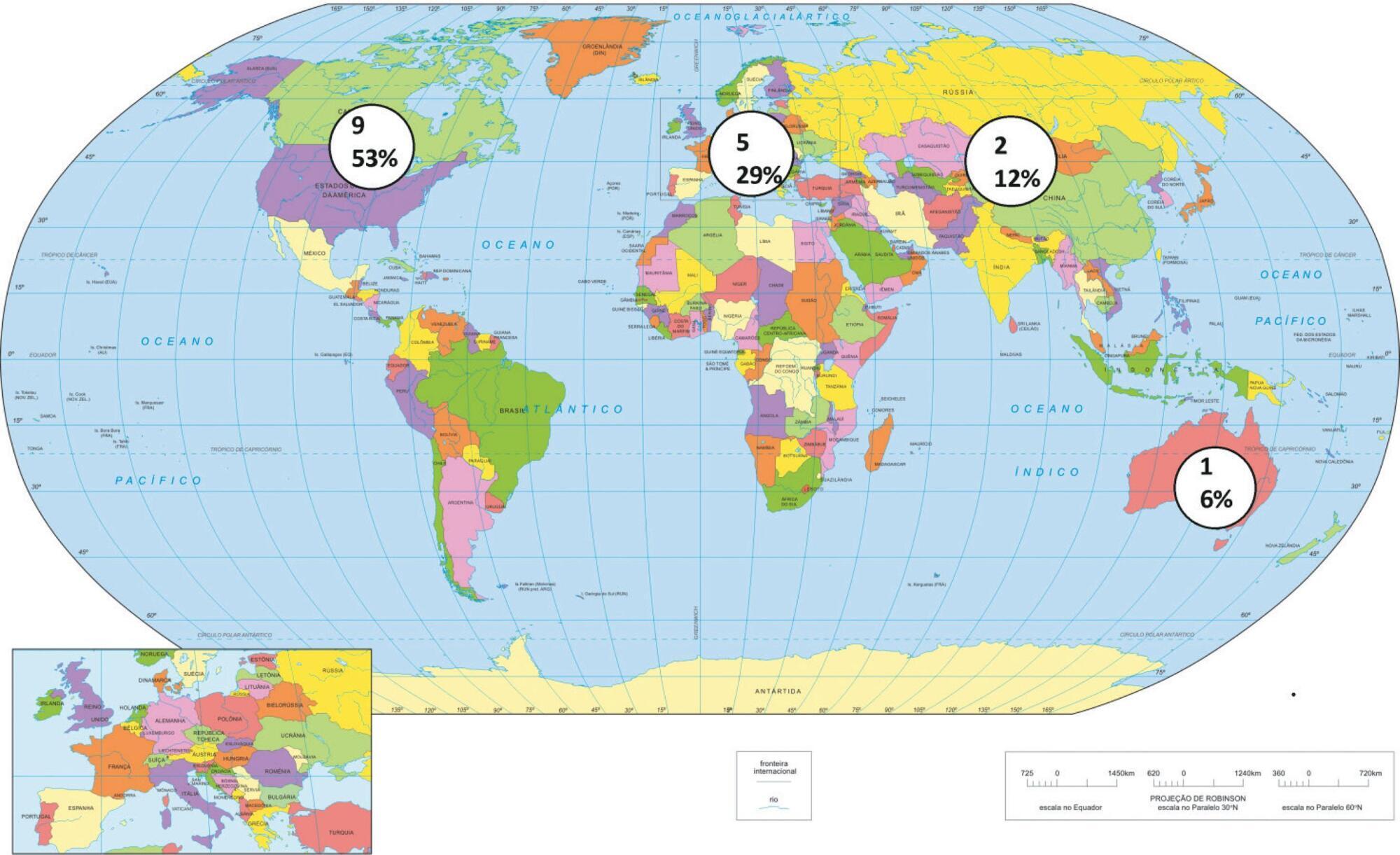
-
ORIGINAL ARTICLE10-21-2019
“Waiting for a miracle”: Spirituality/Religiosity in coping with sickle cell disease
Revista Brasileira de Enfermagem. 2019;72(6):1554-1561
Abstract
ORIGINAL ARTICLE“Waiting for a miracle”: Spirituality/Religiosity in coping with sickle cell disease
Revista Brasileira de Enfermagem. 2019;72(6):1554-1561
DOI 10.1590/0034-7167-2018-0635
Views0See moreABSTRACT
Objective:
To understand spirituality/religiosity as experienced by people with sickle cell disease, and its influence on coping with the disease.
Method:
A qualitative, descriptive, and exploratory study conducted in the State of Bahia. Twenty-nine respondents participated in semi-structured interviews. Content analysis was used to analyze the empirical material.
Results:
Individuals with sickle cell disease experience spirituality/religiosity motivated by their hope for a miracle, and fear of death; among their rites are: reading religious materials, individual and group prayer, and attendance at worship services. The effects on their health include: comfort by means of coping by comparing two evils, anxiety relief, social support, and lifestyle changes; however, spirituality/religiosity may be impaired.
Final considerations:
This study demonstrates the need to qualify health professionals to address spiritual issues of these individuals during illness, with the aims of diagnosing suffering and anguish, and providing care, comfort and strengthening of the spiritual bonds of these individuals.
-
ORIGINAL ARTICLE12-21-2020
Construction and validation of a mobile application for development of nursing history and diagnosis
Revista Brasileira de Enfermagem. 2020;73:e20190674
Abstract
ORIGINAL ARTICLEConstruction and validation of a mobile application for development of nursing history and diagnosis
Revista Brasileira de Enfermagem. 2020;73:e20190674
DOI 10.1590/0034-7167-2019-0674
Views0See moreABSTRACT
Objectives:
to describe the construction and validation process for a mobile application for development of the nursing history and diagnosis.
Methods:
methodological study conducted in 2018 in three stages: content creation, based on the Basic Human Needs categories and nursing diagnoses; content assessment by nine nursing judges, with calculation of the content validity index; and construction of the application, which included definition of the requirements, a conceptual map, implementation and prototyping options, tests and implementation.
Results:
the application was organized by sections: Grouped Basic Human Needs, Cranial pair tests, Clinical assessment scales and Additional tests. Two section were adjusted according to the judges’ suggestions.
Final Considerations:
it is the first application produced in Brazil based on the Basic Human Need categories, which enables quick access to information, concepts and typical nomenclatures of semiology, recording of clinical data and definition of nursing diagnoses.
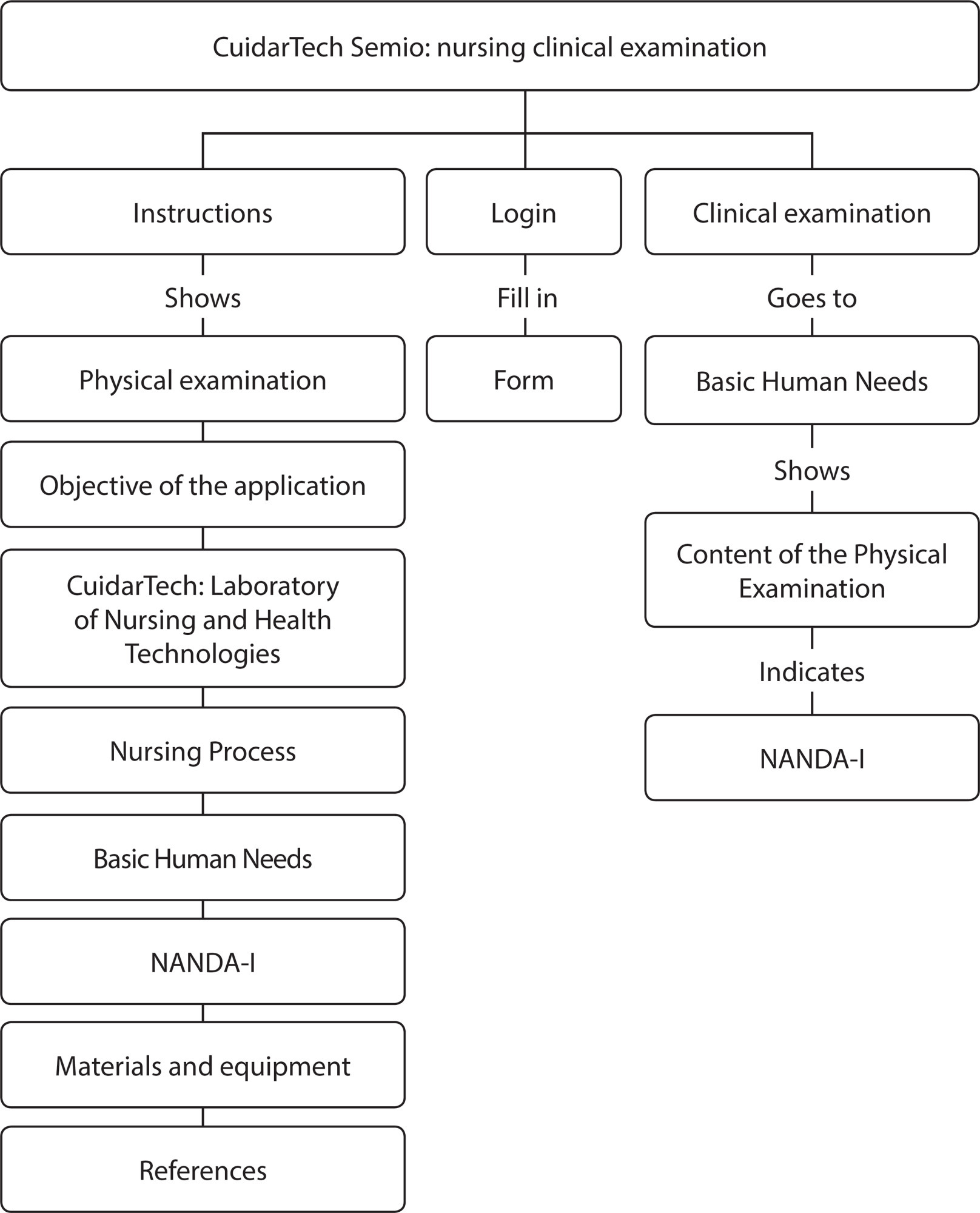
-
ORIGINAL ARTICLE10-01-2022
Factors associated with vulnerability and fragility in the elderly: a cross-sectional study
Revista Brasileira de Enfermagem. 2022;75(2):e20200399
Abstract
ORIGINAL ARTICLEFactors associated with vulnerability and fragility in the elderly: a cross-sectional study
Revista Brasileira de Enfermagem. 2022;75(2):e20200399
DOI 10.1590/0034-7167-2020-0399
Views0See moreABSTRACT
Objectives:
to assess factors associated with vulnerability and fragility in the elderly.
Methods:
crosssectional study with 384 elderly people in Fortaleza, Ceará. The Vulnerable Elders Survey and Clinical-Functional Vulnerability Index – 20 were used. Chi-square and Fisher’s exact tests were used for associations. In the analysis of the combined influence of risk factors, the stepwise logistic regression and multinomial regression methods were adopted.
Results:
251 (65.4%) non-vulnerable and 133 (34.6%) vulnerable elders. From the vulnerable elders analyzed, 42 (30.9%) are at high risk for frailty. Factors associated with vulnerability: age, gender, presence of comorbidities, hypertension, diabetes, osteoporosis and use of polypharmacy. There is a 30% increase in the chance of vulnerability for each additional drug. Physical activity reduces the chance of vulnerability by 60%. Factors associated with frailty: educational level; self-perception of health; comorbidities; polypharmacy.
Conclusions:
it is important to pay attention to the presence of arterial hypertension, osteoporosis, polypharmacy, and encourage the practice of physical activity.
-
ORIGINAL ARTICLE10-21-2019
Caring ability, burden, stress and coping of family caregivers of people in cancer treatment
Revista Brasileira de Enfermagem. 2019;72(6):1541-1546
Abstract
ORIGINAL ARTICLECaring ability, burden, stress and coping of family caregivers of people in cancer treatment
Revista Brasileira de Enfermagem. 2019;72(6):1541-1546
DOI 10.1590/0034-7167-2018-0605
Views0See moreABSTRACT
Objective:
To analyze the association between the caring ability and the burden, stress and coping of family caregivers of people in cancer treatment.
Method:
A cross-sectional study with 132 family caregivers. The following instruments were applied: a characterization instrument, the Caring Ability Inventory, the Zarit Burden Interview, the Perceived Stress Scale, and the Brief COPE. The Spearman Correlation was used with significance ≤5%.
Results:
There were significant and positive correlations between total caring ability and: burden – interpersonal relationship (p=0.03); stress (p=0.02) and maladaptive coping (p=0.00); and inversely proportional correlations with problem-focused coping (p=0.03). The courage had inversely proportional correlation with: self-efficacy (p=0.03), interpersonal relationship (p=0.00), stress (p=0.04) and maladaptive coping (p=0.00). The knowledge had significant and positive correlation with problem-focused coping (p=0.00), adaptive coping (p=0.01), and inverse correlation with stress (p=0.02).
Conclusion:
The level of caring ability correlates with levels of stress and burden, and with the type of coping strategy used by family caregivers.
-
ORIGINAL ARTICLE10-18-2022
Clinical simulation as a Nursing Fundamentals teaching method: a quasi-experimental study
Revista Brasileira de Enfermagem. 2022;75(2):e20201155
Abstract
ORIGINAL ARTICLEClinical simulation as a Nursing Fundamentals teaching method: a quasi-experimental study
Revista Brasileira de Enfermagem. 2022;75(2):e20201155
DOI 10.1590/0034-7167-2020-1155
Views0See moreABSTRACT
Objectives:
to evaluate students’ knowledge gain after the implementation of clinical simulation in Nursing Fundamentals disciplines.
Methods:
a quasi-experimental intervention was carried out with 60 students, distributed in comparison and intervention groups, who underwent traditional teaching and traditional teaching associated with simulated teaching, respectively. Pre-test and post-test instruments were applied to both groups.
Results:
after analyzing the students’ performance through the applied instruments, both groups had a cognitive evolution along with the taught content, however, when compared, the intervention group obtained a higher knowledge gain than the comparison group (p = 0.016), demonstrating progressive and increasing improvement with the use of the methodology.
Conclusions:
simulated teaching significantly helps students in gaining technical-cognitive knowledge. Therefore, it is recommended to adhere to the use of this methodology for teaching Nursing Fundamentals.
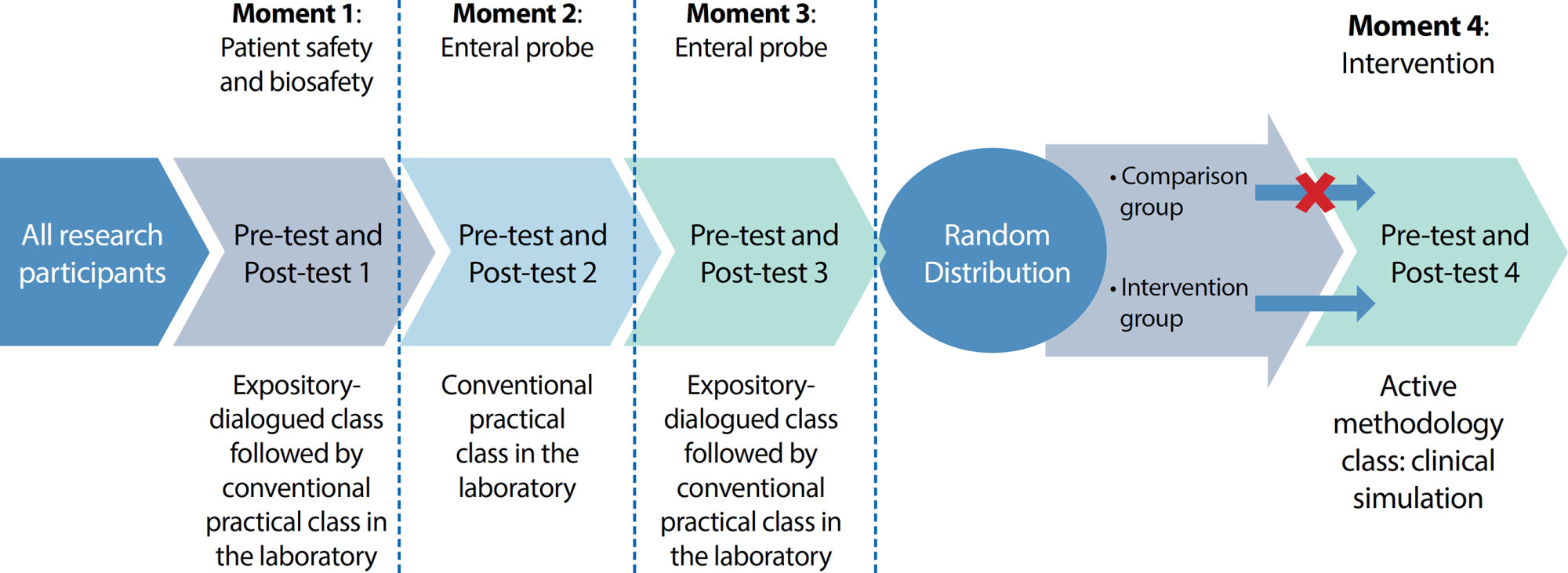
-
ORIGINAL ARTICLE08-10-2020
Eliot Freidson’s sociology of professions: an interpretation for Health and Nursing
Revista Brasileira de Enfermagem. 2020;73(6):e20180950
Abstract
ORIGINAL ARTICLEEliot Freidson’s sociology of professions: an interpretation for Health and Nursing
Revista Brasileira de Enfermagem. 2020;73(6):e20180950
DOI 10.1590/0034-7167-2018-0950
Views0See moreABSTRACT
Objectives:
to analyze theoretical conceptions of Eliot Freidson’s Sociology of Professions scoped on health and nursing professions.
Methods:
Eight nurses were interviewed, all involved in the development of the professional Council on the timeframe from 1975 to 1986. Documental resources were Laws, Ordinances, Resolutions, Reports, Meeting Minutes and Public Deeds. Information was organized as from literature and Eliot Freidson’s conceptions, and thematic content analysis was carried out.
Results:
the concepts authored by Eliot Freidson allowed for the development of a concept chart that portrays the nursing profession and that may be expanded for the other occupations in the health field, in consonance with professional organization in the country.
Final Considerations:
Eliot Freidson’s framework, in interpretation for nursing, consolidates the profession with relative autonomy, expertise by Nursing Care Systematization and credentialism by professional normalizations.
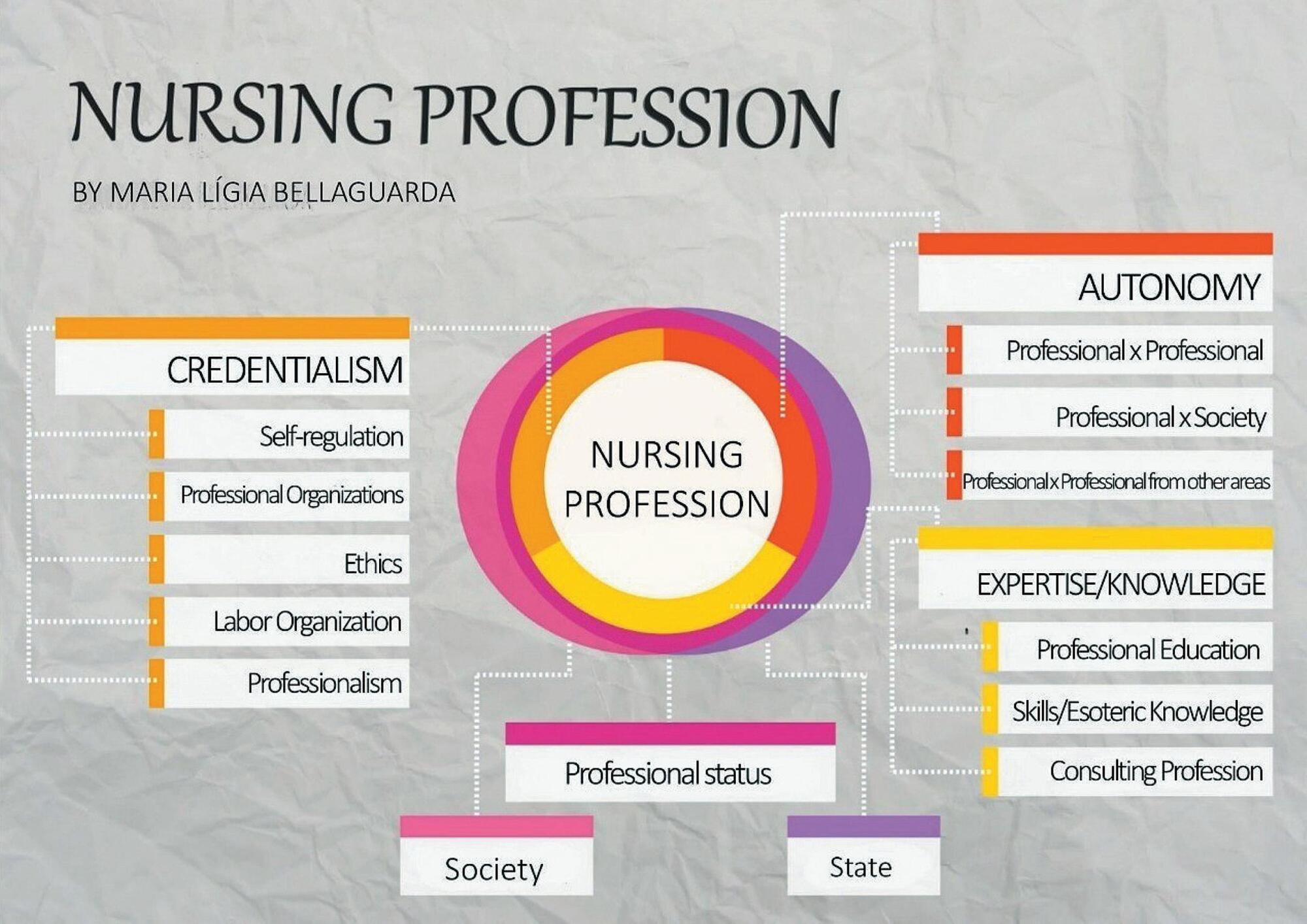
Search
Search in:
Nuvem de Tags
Adolescente (85) Atenção Primária à Saúde (239) COVID-19 (91) Criança (91) Cuidados de Enfermagem (269) Educação em Enfermagem (151) Educação em Saúde (139) Enfermagem (930) Enfermagem Pediátrica (86) Estudantes de Enfermagem (77) Estudos de Validação (131) Família (87) Idoso (208) Promoção da Saúde (99) Qualidade de Vida (104) Saúde do Trabalhador (86) Saúde Mental (145) Saúde Pública (82) Segurança do Paciente (150) Tecnologia Educacional (100)



